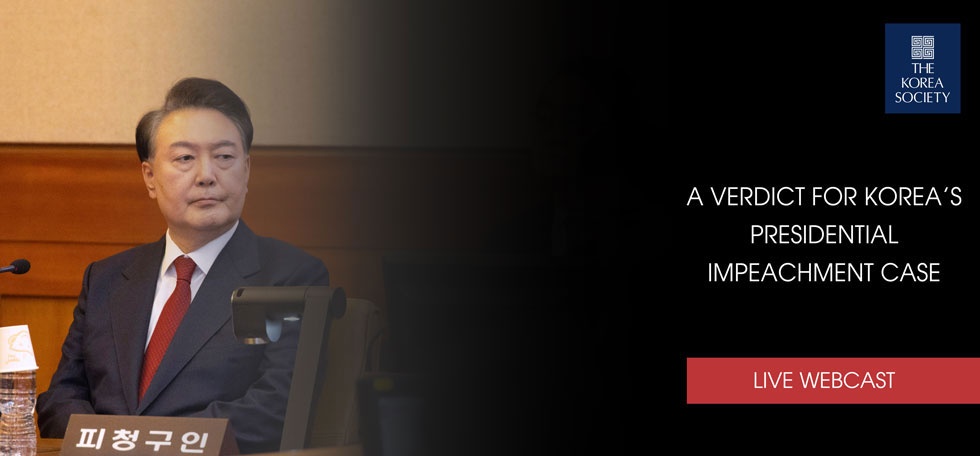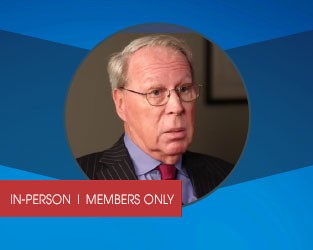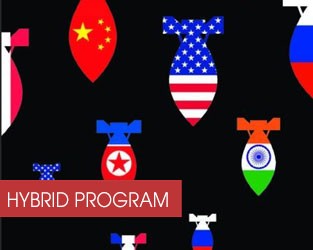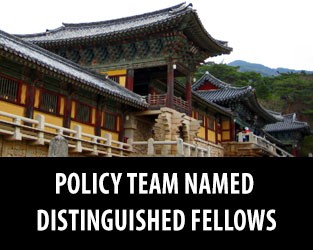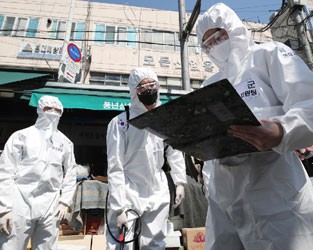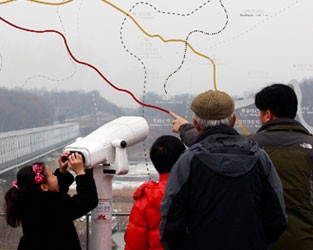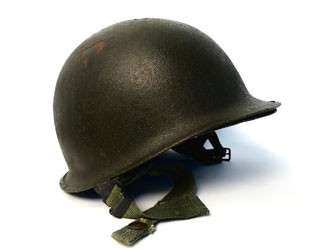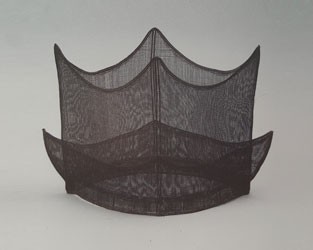Witness to Transformation Refugee Insights into North Korea
MARCUS NOLAND:
I feel like the guys in Spinal Tap, when they try to go onstage and they end up wandering around the bowels of a stadium somewhere in the American Midwest.
Thank you very much for that very generous introduction, Steve. Return engagements are always especially gratifying because they suggest that you didn't screw things up too badly the first time around.
Two North Korean acquaintances met on the street, Mr. Park and Mr. Kim. Mr. Park said to Mr. Kim, "Comrade Kim. Good to see you. Hey, how about that new oil refinery up in Hamhŭng?"
Mr. Kim said, "New oil refinery? I was just in Hamhŭng last week. I didn't see any new oil refinery."
Mr. Park said, "Well, how about the new textile mill in Ch'ŏngjin?"
Mr. Kim said, "Mr. Park, I was in Ch'ŏngjin yesterday. There is no new textile mill."
Mr. Park said, "Comrade Kim, you should stop getting around so much and start reading the newspaper."
The presentation today is going to be sort of a getting around presentation versus what you read in the newspaper. As I was chatting with Ambassador Minton earlier today, there's an obvious and understandable focus on what my colleague Steph Haggard always refers to as the high politics of diplomacy.
Are we going to reengage in the Six-Party Talks and, if so, under what conditions? And if we do, exactly what are we going to accomplish? But there's another aspect of reality, and I don't want to call it low politics. I think it deserves something greater than that. It is about people's everyday lives and the internal dynamics of the society.
What I'm going to focus on today is a discussion of the ongoing, dynamic changes that are occurring in North Korea that we see only vaguely and to a large extent are obscured through the window of the testimonies of refugees.
The work is based on two surveys. The first was a survey of approximately 1,300 refugees done in China in calendar year 2005. The survey was done surreptitiously. The people we were interviewing were, in effect, illegal aliens subject to forcible deportation to North Korea where they could face very severe punishment. And so for understandable reasons, the standards of that survey did not necessarily reach classic social science standards as practiced in other environments.
In part because of those concerns, we were able to receive a grant and do a second survey in November of 2008. This was conducted in South Korea. In this more secure legal environment, we were able to administer a much longer and more nuanced survey questionnaire. We were quite relieved to find that the results that we received from this second, higher quality survey almost entirely coincided with the results we obtained earlier when we did our work in China.
Today what I'm going to do is present some of our work. It's going to be largely from that second survey done in South Korea, but some of it may be from the China survey. I'll let you know as we go along.
There are basically two reasons why we're interested in North Korean refugees. The first is we're interested in them in and of themselves. The refugee problem in North Korea is a first order humanitarian problem. These people exit largely from North Korea to China because of the government of China's unwillingness to allow the United Nations High Commissioner for Refugees to do asylum assessments in China.
These people are forced to do a second out-migration to a third country where they can make their asylum claims: either Mongolia or countries in Southeast Asia such as Vietnam or Thailand. It is truly an arduous journey that these people, some of whom are families with children, are forced to undergo. And due to their lack of legal status, they are subject to all kinds of depredations in China. It is, indeed, a very difficult and tough life. And so our first reason for concern about the refugees is because of the refugees, themselves.
Secondly, as I've already indicated, the refugees provide a window into North Korea, and in this kind of information-constrained environment, they can bring a lot to bear in terms of our understanding of North Korean society and the changes that it's going through.
What I'm going to do in the next few minutes is walk through the book. First I'll spend a little time on that first topic, the refugee experience itself, and then look at what the refugees tell us about North Korea. And I'm going to look at basically three topics: first, what they tell us about the changing economy of North Korea; secondly, what they tell us about the use of the penal system in North Korea; and finally, what kind of political implications these developments may have for North Korea.
And then finally at the end, being from the Peterson Institute for International Economics, I have to be prescriptive, so there's some stuff on policy recommendations. That's the basic outline. Let's start with the beginning, the refugees, themselves.
As I indicated, we did two surveys: one in China and one in South Korea. By and large what we found is that the refugees indicated they left North Korea for economic reasons, but the share that cited political motives was rising and were, in the more recent survey, more than one-quarter of the people we interviewed.
We found that probably half or more of the people we interviewed in China in a clinical setting would be diagnosed as suffering from Post-Traumatic Stress Syndrome. Indeed, in South Korea, there is growing medical literature and medical practice involving dealing with the psychological afflictions of the refugee or defector population once they make it to South Korea. We find that the psychological distress is linked both to their experiences in North Korea, in particular the continuing reverberations of the famine experience on this population, as well as their experiences in China, which as I indicated can be quite harsh.
Among the refugees we interviewed in China, relatively few had an interest in remaining in China, at least under rules current at the time. If their status was regularized, then a substantial number of these people might be willing to essentially stay in China, living in the border area within the Korean-Chinese community there. But under the current rules where they are subject to forcible repatriation to North Korea, not very many want to stay in China.
Most of them want to go to South Korea, but interestingly enough the younger, more educated ones express a preference for coming to the United States. I find it really extraordinary. Despite the fact that they have been subjected to lifelong, virulently anti-American propaganda, the young, educated North Korean refugees want to come to Disneyland. I think I'll leave it at that and move on in the interest of time.
What about the economy? Well, one of the things we know is that the North Korean economy has basically marketized over the last fifteen to twenty years. That marketization was not any kind of intentionally planned, top-down reform, but rather a product of state failure, and the state has never been comfortable with that process. And so much of the book is devoted to household economics and understanding how people operate in this new kind of semi-reformed, highly corrupt market economy that North Korea has become.
Just to give you some indications of some of the interesting things that came out of that is we asked people what the best way is to make money in North Korea, and as you can see, the best way to make money in North Korea is go for the green. It is to engage in market activity. But the growth sector (and each of these panels represents people who left at a different time, so it's looking at change over time) is the one in red, and that is those who stated they engage in corrupt or criminal activities.
We asked them another question about what the best way was to get ahead. As you can see, these blue panels remain the dominant way of getting ahead, and that's the state or the party. So the state remains the dominant institution in society. The growth industry, or the one of increasing preference, is going into business. Interestingly enough, joining the Army (the red one) almost disappears despite military-first politics. For the average North Korean conscript, it is increasingly well understood that joining the Army is not the way to get ahead. And these two panels are linked, as I will discuss in a moment.
Increasingly in North Korea, involvement with the state or the party is not undertaken out of patriotism or some sense of fidelity. Rather, the state and the party are platforms for corruption. They are platforms for economic predation and enriching yourself on the backs of your neighbors. I will elaborate on that in a moment.
Whenever you do research, you go into the project with a set of prior beliefs or expectations, but one almost always, if you're doing good research, finds things that you were not anticipating. One of the things that Steph and I didn't fully anticipate when we began this research was the extent to which the penal system in North Korea increasingly functions not only in its traditional role as a mechanism of criminal control or political repression, but increasingly as a mechanism for economic extortion.
For example, we found that among the respondents in our samples, those who were engaged in market activities had a 50 percent higher arrest rate. And once they were arrested, they were subject to punishment without any kind of due process, in most cases. We asked them if before they were incarcerated they had any formal legal procedure or trial, and only 12 percent said yes. The vast majority said there were no formal legal proceedings and that they were just incarcerated.
Once in incarceration, they were subjected to severe punishment. North Korea has a highly articulated penal system ranging from what are called labor retraining centers at the bottom through institutions that would be roughly equivalent to jails and felony prisons up to the political gulag. We expected to observe an escalation of these rates of abuse in institutions as you went from the relatively mild institutions to the hardest core political prisons. Indeed, we do observe that escalation of abuse.
However, the escalation is far milder and the slope is far flatter than we expected. Even people in those lowest-level institutions, that by and large are where many of these so-called economic criminals are incarcerated, are subject to fantastic rates of abuse. You basically have a system in which, roughly speaking, because of incredibly broad definitions of economic crimes, any average, non-elite North Korean going about their day-to-day life is probably in violation of one stricture or another. The police are given extraordinary discretion about who they arrest, how long they detain them and the conditions under which those individuals are detained.
Given that set of facts, this is an almost perfect mechanism for extracting bribes, because if you know that the police can take not only you, but your family, and incarcerate them in these facilities where terrible abuses are practiced, you will be willing to pay to keep yourself from being entangled in such a system. We find, for example, that even prisoners in these lowest level facilities for the median length of incarceration (I don't want to call it a sentence, because it's not a sentence) reported a 60 percent likelihood of observing an execution and more than an 80 percent likelihood of observing forced starvation. These conditions are really quite horrific.
As I mentioned, it is what they reported. These are self-reported accounts, and we have no way of checking the accuracy of those accounts. But we had little tricks within our survey to informally check to see if the patterns and responses appeared to be running off the rails or not. For example, in the section where we asked people who reported they had been incarcerated about their experiences in incarceration, we start off asking them a hierarchy of questions.
We asked them if they had ever seen a prisoner beaten. The affirmative response rate on that was about 100 percent. I suspect that if you went to the D.C. city jail or Rikers Island and you started asking the inmates if they had ever seen a prisoner beaten, the affirmative response rate would probably be roughly 100 percent. I expect that in most prisons around the world, if you ask prisoners if they have ever seen anybody beaten, they will say yes.
Then we started getting more specific asking if they had ever seen anybody beaten to death or seen a public execution, all the way down to the alleged crime of forced abortion and infanticide. What's very interesting is the patterns of responses drop appropriately as you go from what you would expect to be relatively common, ubiquitous abuses to the highly specific abuse of infanticide and forced abortion, and the pattern in responses line up across the two surveys. This leads us to believe that whether those numbers are absolutely accurate or not, there is serious information contained in them and that the people are not just telling us what they think we want to hear.
There's also a gender dimension to all of this, and Steph and I are actually in the process of writing a paper devoted to gender issues. One of the ways that North Korea developed in the 1990s is in part due to a lack of any coherent women's movement or feminist thought in North Korea. State employment was supposed to be more politically advanced men's work, and so women were disproportionately shed from employment in state-owned enterprises, party offices, and government offices. They were essentially thrust into this somewhat Hobbesian market economy that was developing in the 1990s.
Among the most recent cohorts of refugee arrivals that we interviewed, 95 percent of the women who were engaged in market activities report that they paid bribes in order to do their work. And among the men, 37 percent (more than one-third of the men) said that the best way to get ahead is crime and corruption.
And indeed, when we look at the responses by people who work in government offices, they report that, in fact, their colleagues have become more corrupt. They also report that they spend more and more time on ideological indoctrination. The center seems to understand that it is losing control of its agents at the ground level.
The upshot of all this is because of the women being basically pushed out of state employment into the market, the state is increasingly male-dominated, and in fact you have an increasingly male-dominated state preying on the increasingly female-dominated or identified market. There's a gender dimension to all of this, as well.
What are the political implications of all this? One of the things we found is that our respondents indicate increasing access to foreign media and foreign news sources, specifically. I call this upper chart the Bill Clinton chart (and I should say I used to work for Bill Clinton, so I'm not making some kind of partisan point here. It's just when I saw the chart, I immediately thought of my former boss).
What you see in this upper chart is the red part represents the people who said they didn't have any access to foreign media. The blue part represents the people who said they had access to foreign media and they consumed it. The green part are the people who said they had access to foreign media, but they didn't consume." I forget exactly how Bill Clinton put it, but it was something like, "I smoked, but I didn't inhale." I always think of the green people as the Bill Clintons. They had access, but they didn't actually consume.
One of the interesting things about this chart is you can see the blue part is getting bigger steadily (more people are consuming foreign news media) but the green part is disappearing. The inhibition on consuming foreign media has disappeared. That is important, because access to foreign media is associated with more dissenting views, and increasingly the meta-narrative of the regime (which is that all of their troubles are due to hostile foreign forces) is increasingly disbelieved by the population, at least according to these surveys. Increasingly the population holds their government responsible for local conditions.
These surveys were done before the November, 2009 currency reform that Steve mentioned in the introduction. I think that after that experience, there are probably very few North Koreans who believe that their problems are primarily due to foreigners. Nevertheless, it is an atomized population. It is a society characterized by very low levels of trust, and I'm sure you can understand why.
We asked our respondents a series of questions that could be thought of as political anthropology. We asked them when they were in North Korea if among friends they joked about conditions or complained about conditions. We asked them if they joked about the government or complained about the government. We asked them if they joked about Kim Chŏngil or complained about Kim Chŏngil. We asked them if they knew people who were organizing against the government.
This is one of these glass half empty, half full type things. Haggard thinks it's half full. I think it's half empty. Remember, we're interviewing refugees. These people have voted with their feet. Almost by definition, they have negative views of conditions and the regime, otherwise they wouldn't have left the country. Even among this population, the share never rises above 40 percent that report that among their peers, they joked about conditions or joked about the government. So, you have a situation in which there is, I would argue, increasing dissatisfaction, but it is not clear that there are mechanisms for expressing that dissatisfaction.
This leads me to the last thing I'll talk about in this section which is something again that we hadn't fully appreciated when we began this research. It's something that I ended up calling the market syndrome. We find that people who are engaged in market activities are more likely to identify political reasons as their motive for departure. They are 50 percent more likely to have been arrested. They have even more negative views of the regime than the average refugee. And here is the critical part. They are more likely to communicate those views to their peers.
In essence, the market is emerging, not only as an institution to address the material deprivation of the North Korean people, but it is increasingly a kind of semi-autonomous zone of social communication and potentially political organizing. And on its own terms, the state is right to fear the market.
As I mentioned, we're interviewing refugees and these, as I said, are people who have voted with their feet. The immediate question that arises is to what extent are their experiences or their views representative of the remaining resident population of North Korea. On one level, that is a question that is impossible for us to answer because there may simply be characteristics of these individuals that we can't observe that lead them to have very peculiar, distinct views and ideas.
But there is quite a bit of demographic information we have on these individuals. We know their gender, their age, and what province they're from. We know what their occupation was. We know what their political classification was. We know what their father's political classification was. We know what their father's occupation was. We know their age. We know a lot of basic demographic information.
We also know something about their life experiences. Did they receive food aid? Had they been incarcerated? What we do in the book is we take all that information that we do have on these individuals and we build multivariate statistical models to try to understand if they have characteristics that would lead them to have unusual opinions or experiences that would not be representative. And then through those models, we actually make counterfactual projections onto the remaining resident population.
For questions where we're asking them what you might consider factual questions (how much of their household income came from market activities or how much of their household income came from employment in the formal economy) what we found is that the projected differences between the sample that we have and the national population appear to be very slight. For all intents and purposes, they really do, on the factual questions, seem to be pretty representative.
On questions that relate to opinions, there's a little bit more difference. For example, we asked them some questions that might be considered approval ratings type questions about the political regime, and here's the sample. Here's our projection of the national average, and as you can see it's a little higher. When we calculate what statisticians call the 95 percent confidence interval (are you 95 percent sure that those two numbers are the same, or can you say with a 95 percent degree of confidence that they're different) we can never reject the hypothesis that those are the same numbers.
In the end, we cannot prove that the responses we had are perfectly representative of the remaining resident population, but we think that given all the analysis that we do in the counterfactuals, there is some basic information that is valid contained in these responses, and deserves to be taken seriously. So, what do we do?
The refugees, of course, are simply the tip of the iceberg of a much larger human rights and humanitarian problem in North Korea. And so we divided our analysis into policies directed at the refugees and policies directed at the remaining resident population. Then we further divided the policies into what we called direct policies and indirect policies.
Direct policies are things in which you negotiate with the North Korean government. We would want to negotiate about family unification or we might want to negotiate over the terms of humanitarian relief. But then there are also indirect policies. We can provide information to the population of North Korea whether the government of North Korea acquiesces or not.
We understand that the pursuit of some of these things called indirect policies may affect your ability to pursue what we've called direct policies. The North Korean government may not be happy about some of these things, but we think under the circumstances it's worth pursuing this agenda given, frankly, what we see as the relatively meager progress through official diplomatic channels.
In the end we came up with something called eyes open engagement. Earlier Mark Minton's phrase was engagement without illusions. I think it's basically the same idea. We want to engage with North Korea. We want to stimulate transformation in a constructive direction to encourage a society that is more humane internally, and less bellicose in its external relations, but we have our eyes open about the nature of this regime and the history here.
In the end, where we really want our focus is information and the market. We want to try to encourage the development of the market in North Korea, because we see it as a way of addressing the material needs of the North Korean people. We see it as a mechanism for reducing the pervasive power of the state creating alternative pathways to status and wealth. We also see it as a mechanism to at least start to create the conditions that impose greater constraints on, if not political power, then the ability of the North Korean government to act in certain ways.
The real tragedy of North Korea is the lack of accountability of this regime. It has an almost unimpeded capacity to impose misery on its own people. What we are essentially trying to do is lay out an agenda in which gradually, over time, one begins to constrain that regime's ability to do that and to try to bring greater accountability into the system. Ultimately one would want to see a fairly dramatic transformation or change in the political regime, but we recognize that, that may be far away.
What are the basic conclusions? Obviously, North Korea faces a looming succession issue. We think there is probably widespread discontent, but there seems to be a complete absence, at least as far we can see, of civil society institutions capable of channeling that discontent into constructive political action. We hope those institutions and groups are there, but Haggard and I, at least, can't see them.
There's no Catholic church or Solidarity trade union like there was in Poland. There's no civic forum like there was in Czechoslovakia. There's not even the role that the Catholic church and Cardinal Sin played in the Philippines acting as an alternative moral pole in legitimating dissent. We don’t see any of those things in North Korea. One can imagine how they may be there under the surface in various sorts of ways, but we can't see them. We think it's a situation where there's probably widespread discontent, but little capacity for acting on that discontent.
As a consequence, what we see people doing is what the sociologist James C. Scott called in a different context exiting the system: everyday forms of resistance including going into the market, listening to foreign news, acting in ways that essentially disengages oneself from the state which is quite difficult given the intimate nature of state control through the criminalization of economic activity in the penal system.
As I said, we see the market as a zone of autonomy and freedom. We want to strengthen that and ultimately, to use a Marxist phrase, we want to intensify the contradictions. We want to try to encourage transformation that will make the regime more accountable and constrain its abilities to impose misery in the way that it does today.
That's my presentation. I would be happy to answer any questions or engage in dialogue in our remaining time. I want to give a plug to our blog. Steph and I run a blog North Korea: Witness to Transformation. We have postings daily. I'm not sure what's up today, but it's something Steph wrote. I know I didn't write it. We've given plugs to The Korea Society events and if this is on The Korea Society website, we'll put a link in our blog.
Again, it's been a great pleasure to be invited back, and I look forward to our further discussion. Thank you.
[Applause]
" target="_blank">iTunes
![]() Marcus Noland, deputy director and senior fellow at the Peterson Institute, addresses The Korea Society on his and Professor Stephan Haggard’s study of surveys conducted in China and South Korea of North Korean refugees. Their work both illuminates the plight of the refugees and explores the implications for North Korea’s ongoing internal transformation. Noland, deputy director and senior fellow at the Peterson Institute, discusses the survey findings and his new release. Former ROK Foreign Minister Yoon Young-kwan writes of the book: “Human rights and the protection of refugees is not a concern of left or right, or of the U.S. only; it is an issue of importance to all Koreans, and indeed all countries. Haggard and Noland provide compelling evidence of the ongoing transformation of North Korean society and offer thoughtful proposals as to how the outside world might facilitate peaceful evolution.”
Marcus Noland, deputy director and senior fellow at the Peterson Institute, addresses The Korea Society on his and Professor Stephan Haggard’s study of surveys conducted in China and South Korea of North Korean refugees. Their work both illuminates the plight of the refugees and explores the implications for North Korea’s ongoing internal transformation. Noland, deputy director and senior fellow at the Peterson Institute, discusses the survey findings and his new release. Former ROK Foreign Minister Yoon Young-kwan writes of the book: “Human rights and the protection of refugees is not a concern of left or right, or of the U.S. only; it is an issue of importance to all Koreans, and indeed all countries. Haggard and Noland provide compelling evidence of the ongoing transformation of North Korean society and offer thoughtful proposals as to how the outside world might facilitate peaceful evolution.”
